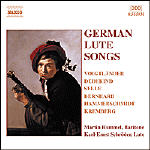About the year 1600 three developments in German musical life came together, the special liking of German musicians for the lighter form of Italian madrigal, the villanella, which replaced the principle of equality of voices in a polyphonic texture in favour of allowing prominence to one voice, with the melody clearly at the top, and the principle, derived from Italian dramatic music, of an expressive single melodic line in monody accompanied by basso continuo. Both these combine with the German tradition of the dance-song. The musical conditions were present for the rise of a new form as, in accordance with the literary theory of Martin Opitz (Von der deutschen Poeterey, 1624), German verse and word accentuation should agree.
German Lute Songs
